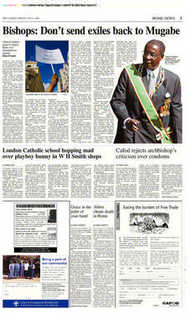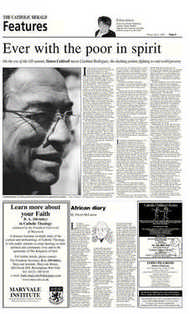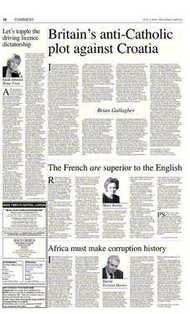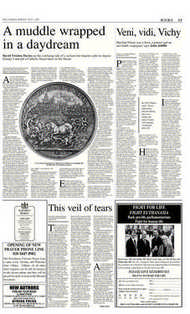Page 4, 1st July 2005
Page 4

Report an error
Noticed an error on this page?If you've noticed an error in this article please click here to report it.
Tags
Share
Related articles
Archbishop Cordes, Cafod And Condoms
Vatican Plays Down Condom Study
Bishops In France Shift Stance On Aids
Letters To The Editor
Comic Relief Critics Unhappy With 'ethical' Pledge
Vatican official’s dismay at Cafod condom stance
The Vatican has, over the years, grown increasingly concerned about certain aspects of Catholic humanitarian relief. Too often, officials argue, a secular philosophy rides roughshod over the field of aid and development, and Catholic aid agencies seem only too willing to play along.
“Christian aid, by its essence, is a mirror for the Christian manner of living the Gospel,” Archbishop Paul Josef Cordes, president of the Pontifical Council Cor Unum, the Pope’s charitable arm, recently told The Catholic Herald. “Sometimes Christ’s message is reduced to that which interests public opinion: justice, peace, and quality of life. It is rare one speaks about sin, love of God, and eternal life [as a result] the vertical dimension of charity – that which is beyond earthly and secular humanism – is in danger of being lost.” As the Holy See’s “docking point” for Catholic charitable organisations, Cor Unum’s primary purpose is to provide support to these agencies. Established by Pope Paul VI in 1971, the Council aims to provide a unique forum for them to interact and collaborate with the bishops of the Church, equipping them with human and theological guidance through the “catechesis of charity”.
But the German archbishop, a friend of Pope Benedict XVI since the 1960s, said he and the Council are “very concerned” about Catholic agencies that fail to uphold authentic Catholic charity and instead reduce it “to a very pragmatic redistribution of goods, disconnected from evangelisation”.
A number of reasons are commonly given for this tendency. The first is a growing drift towards secularism, not just within certain humanitarian agencies but in soci ety in general. A second cause is the close collaboration often required between Catholic agencies and those of other denominations or faiths, which can sometimes lead to unhealthy compromise. A third cause can sometimes be governmental pressure.
But arguably the strongest factor leading to secular leanings among Catholic aid agencies is the rapid increase in government funding, which has resulted in certain governments demanding that agencies spend their funds according to the orientations of a particular government programme.
Indeed, the increase in government funding of aid and development agencies has been staggering. In 1970 non-governmental organisations involved in refugee work received, on average, 1.5 per cent of their funding from governments. In 1997, the proportion had risen to 40 per cent. In 2002, Catholic Relief Services received 30 per cent of its funding from the US government. The Department for International Development provides nine per cent of Cafod’s funding. Without such government help funds would be hard to find.
“Much of this temptation to secularise stems from the often very competitive world of funding,” said Archbishop Cordes. “Agencies must struggle to obtain additional funding, whether from governments or private foundations.” Yet the Council strongly urges agencies to resist this temptation, and to continue their charitable work in the name of Jesus the Messiah. In so doing, Archbishop Cordes argues, the power of Christ is made manifest because “only this type of charity is worthy, from a Christian perspective, of both giver and receiver”.
For some, a prime example of this secular drift among some Catholic aid agencies was highlighted by Cafod’s support last year for an “ABC” approach to condom use and HIV/Aids (Abstinence, Be faithful, use a Condom). Although the agency does not distribute condoms itself, and insists that it maintains the Church’s policy that abstinence is the only way to prevent the spread of the disease, by not ruling out condom use as a means of protection against HIV/Aids, the agency went against established Church teaching, precipitating an outcry from conservative Catholic groups, and a censorious response within the Vatican.
For Archbishop Cordes, Cafod’s policy showed how easy it is for Catholic agencies to fail to realise their spiritual as well as practical purpose.
“It is illogical to represent the Church within the ambit of charitable aid and, at the same time, to do so without being part of the Church’s mission,” he explained. “Charity, as an outreach of the Church’s mandate to make the Gospel known, must necessarily operate within the framework of the Church’s teaching.” Pope Benedict made this clear last week when he decided to follow the G8 cancellation of debts owed by 18 developing countries by announcing his intention to fulfil one of John Paul’s last wishes to hold a Synod for Africa.
“I hope this meeting,” Pope Benedict said, “will mark another impulse for the African continent for evangelisation, the consolidation and growth of the Church and the promotion of reconciliation and peace.” Archbishop Cordes and some of his staff recently returned from Asia where they saw first-hand the devastation caused by the tsunami. He singled out local churches and Catholic relief services for their “heroic” response in providing “emergency food, shelter, clothing, medical aid as well as opportunities for prayer and joining together in faith”.
But while all of the material help is crucial it is, above all, that faith and sense of mission which the Holy See wants to see brought back to the centre of Catholic aid and development work.
blog comments powered by Disqus

















